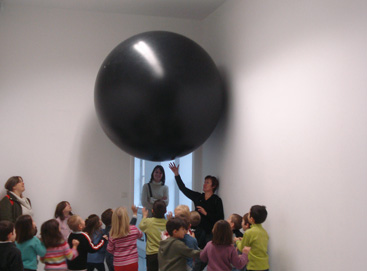
Born in 1960 in Ypres (BE). Lives and works in Tournai (BE)

2008
Object made of polypropylene, helium, and oxygen
150 x 150 x 150 cm (sphère)
Year of Purchase: 2008
The French essayist Joseph Joubert discerned “ingenuity, even genius, in the spirit’s thirst to observe invisible things, move intangible things, and paint featureless things.” Similarly, Edith Dekyndt’s work gives one a sense of quest for the infinite likely to quench that thirst. Synonyms of personal as well as universal discoveries, exploration, crossing, surpassing, overcoming, arouse our curiosity about the world that surrounds us—curiosity characteristic of the thirst for artistic experimentation. The fleeting, molecular, fragile, and unstable point that anchors the artistic procedure in the real, physical world, is always intuitive. Dekyndt captures, encapsulates a moment of life, revealing free configurations of movement.
Bypassing scientific demonstration, the artist nevertheless creates the conditions of possibility of experience. She thus enacts Gaston Bachelard’s philosophy formulated in La Formation de l’esprit scientifique (1938), where he noted that “what one believes one knows clearly, obscures what one should know.”
Ground control is at once a sculpture and an installation. Fashioned out of very fine synthetic material, a human-sized balloon is filled with a mix of oxygen and helium which keeps it suspended between the floor and the ceiling. The title of the work, with its double meaning (evoking, on the one hand, a geographer-surveyor who establishes coordinates in the field and measures elevations in order to draw up maps and, on the other, in aeronautics, a ground command center), refers here to the changing variables of the laws of physics over the course of a day. Surrealistically floating in space, Ground Control gauges the conditions of earthly life whose development is dependent on temperature and atmospheric pressure. For example, visitors crowding around the balloon will perceptibly modify its trajectory as a result of increased body heat. In the installation, one comes to understand that the “balloon” sculpture—a “sculpture without a base,” as the artist likes to say—cannot function without air or other factors which decide its itinerary within the allotted space. Dekyndt’s points out the underlying mechanisms liable to change with even the slightest modification. Moreover, the sphere (and the circle) are part of the artist’s formal vocabulary, and her metaphorical syntax refers to life elements, such as the planet or the seed, which are a plea for a generative figure of existence and soul.
Time is crucial in Edith Dekyndt’s work. Whether it extends chronologically or evokes seasonal rhythms, time is an irreversible marker that imprints its impermanence on things, sometimes even subliminally. Apparently defying gravity, Ground Control opens the door of imagination by performing a shift into an nth dimension which materializes before our very eyes, arousing our desire to enter it. There is no doubt that some will start dreaming about the possibility of a world of floating mountains where the seven-mile boots will do the walking.
Cécilia Bezzan